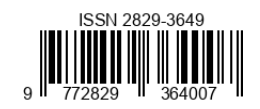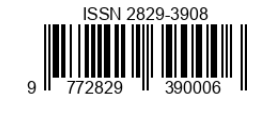Development of E-Modules Containing Literature on the Theme "I Love Indonesia" in Elementary Schools
DOI:
https://doi.org/10.56910/literacy.v4i1.2009Keywords:
ADDIE, digital learning, e-module, elementary school, literatureAbstract
This study aims to develop an e-module containing literature with the theme "I Love Indonesia" to improve students' understanding of literature and strengthen nationalism values. Using the ADDIE model ( Analyze, Design, Develop, Implement, Evaluate ), this study was conducted at SD Islam Al Amanah Tangerang Selatan through a research and development (R&D) approach. The results of the analysis indicate an urgent need for interactive digital teaching materials that are appropriate to the characteristics of elementary school students. The development of the e-module considers pedagogical, aesthetic, and interactivity aspects by integrating text, images, animation, and video. Formative evaluations were conducted throughout the development process, while summative evaluations showed that 84% of students experienced an increase in literary understanding after using the e-module, and 90% of teachers responded positively to the ease of compiling and delivering the material. Although the results showed high effectiveness in terms of nationalism (92%) and practicality of use (88%), student participation (84%) indicated the need for improved interactive features. Thus, this e-module is not only an effective medium in learning literature, but also an important tool in strengthening nationalist character education in elementary schools.
References
S. M. Alessi and S. R. Trollip, Multimedia for Learning: Methods and Development, 3rd ed. Boston: Pearson Education, Inc., 2011.
Z. Arifin, Developing Teacher Competence in Compiling Digital Teaching Materials. Jakarta: Prenada Media Group, 2022.
R. M. Branch, Instructional Design: The ADDIE Approach. New York: Springer, 2009.
R. C. Clark and R. E. Mayer, E-Learning and the Science of Instruction: Proven Guidelines for Consumers and Designers of Multi-media Learning, 4th ed. Hoboken, NJ: John Wiley & Sons, 2016.
W. Dick, L. Carey, and J. O. Carey, The Systematic Design of Instruction, 9th ed. New York: Pearson, 2022.
R. M. Gagné, W. W. Wager, K. C. Golas, and J. M. Keller, Principles of Instructional Design, 5th ed. Belmont, CA: Wadsworth/Thomson Learning, 2005.
S. Hartati, “Project-based learning in improving critical thinking skills of elementary school students,” Jurnal Pendidikan Dasar Nusantara, vol. 7, no. 2, pp. 154–168, 2021.
A. Hidayat and S. Khotimah, “Effectiveness of using e-modules in improving students’ understanding of literature,” Jurnal Teknologi Pendidikan Indonesia, vol. 8, no. 1, pp. 25–36, 2019.
G. J. Hwang, C. L. Lai, and S. Y. Wang, “Seamless flipped learning: A mobile technology-enhanced flipped classroom with effective learning strategies,” Journal of Computers in Education, vol. 2, no. 4, pp. 449–473, 2015.
D. H. Jonassen, Learning to Solve Problems: A Handbook for Designing Problem-Solving Learning Environments. New York: Routledge, 2012.
S. Juliana and R. Sulistyowati, “Implementation of interactive e-modules in elementary school thematic learning,” Elementary School Scientific Journal, vol. 7, no. 1, pp. 12–21, 2023.
M. J. Koehler and P. Mishra, “What is technological pedagogical content knowledge (TPACK)?,” Contemporary Issues in Tech-nology and Teacher Education, vol. 9, no. 1, pp. 60–70, 2009.
R. E. Mayer, Multimedia Learning, 2nd ed. Cambridge: Cambridge University Press, 2009.
R. E. Mayer, Multimedia Learning, 3rd ed. New York: Cambridge University Press, 2021.
G. R. Morrison, S. M. Ross, and J. E. Kemp, Designing Effective Instruction, 8th ed. Hoboken, NJ: Wiley, 2019.
A. Nugroho and R. Fadhillah, “Utilization of children's literature in developing social values of elementary school students,” Journal of Character Education, vol. 9, no. 1, pp. 18–27, 2022.
R. Oktaviani and D. Haryanto, “Development of digital teaching materials with the ADDIE model for elementary school students,” Journal of Educational Technology, vol. 6, no. 2, pp. 98–109, 2021.
T. Purnamasari and E. Kurniawan, “Challenges and obstacles to learning literature in elementary schools,” Journal of Indonesian Language and Literature Education, vol. 8, no. 2, pp. 134–146, 2023.
I. Rahmawati, A. Prasetyo, and D. Nugroho, “Advantages of interactive e-modules in adaptive learning in elementary schools,” Journal of Elementary Education Innovation, vol. 10, no. 1, pp. 45–53, 2023.
C. Redecker and Y. Punie, European Framework for the Digital Competence of Educators: DigCompEdu. Luxembourg: Publica-tions Office of the European Union, 2017.
R. A. Reiser and J. V. Dempsey, Trends and Issues in Instructional Design and Technology, 4th ed. Boston: Pearson Education, Inc., 2017.
A. S. Sadiman, R. Rahardjo, A. Haryono, and A. Harjito, Educational Media: Definition, Development, and Utilization. Jakarta: PT RajaGrafindo Persada, 2012.
W. Setyaningsih, “ADDIE model in developing digital teaching materials: A systematic review,” Journal of Learning Technology, vol. 11, no. 2, pp. 122–135, 2023.
Sugiyono, Quantitative, Qualitative, and R&D Research Methods. Bandung: Alfabeta, 2021.
L. S. Vygotsky, Mind in Society: The Development of Higher Psychological Processes. Cambridge, MA: Harvard University Press, 1978.
H. Wibowo, “Literary education in fostering student nationalism,” Journal of Educational Sciences, vol. 10, no. 1, pp. 43–56, 2003.
B. J. Zimmerman, “Becoming a self-regulated learner: An overview,” Theory into Practice, vol. 41, no. 2, pp. 64–70, 2002.
Downloads
Published
How to Cite
Issue
Section
License
Copyright (c) 2025 LITERACY : International Scientific Journals of Social, Education, Humanities

This work is licensed under a Creative Commons Attribution-ShareAlike 4.0 International License.







